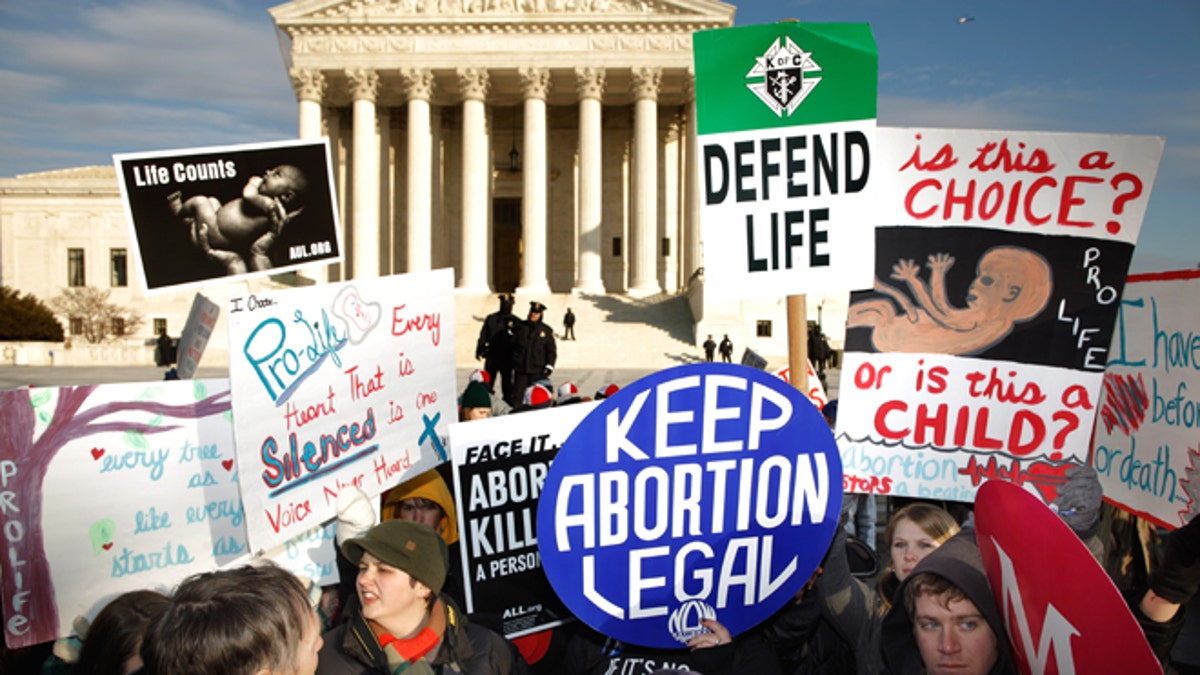
WASHINGTON, DC - JANUARY 24: Anti-abortion and pro-choice demonstrators argue in front of the Supreme Court during the March for Life January 24, 2011 in Washington, DC. The annual march marks the anniversary of the landmark Roe v. Wade decision by the court that made abortion legal in the United States. (Photo by Chip Somodevilla/Getty Images) (2011 Getty Images)
Four decades after the Supreme Court decision in Roe v. Wade, abortion opponents and proponents in the Latino community find themselves still heatedly debating the issue.
Abortion rights advocates celebrated the anniversary with a candlelight vigil at the Supreme Court to commemorate the ruling. Abortion advocates from the National Latina Institute for Reproductive Health (NLIRH) promoted a new campaign entitled “Yo Te Apoyo” or “I support you,” concentrating on the rights of Latinas in the community.
“Outdated labels like 'pro-choice' and 'pro-life' don't accurately reflect the sentiment of our community," said Jessica González-Rojas, executive director of NLIRH. “"Even now, 40 years later, outdated assumptions about Latino/as and reproductive care remain.”
A survey by NLIRH last year found that 74 percent of Latinos support a woman’s right to make private decisions about abortion without politicians intervening.
The Latino community, the nation’s largest minority ethnic group, makes up 16 percent of the U.S. population but experiences more than twice the number of abortions (19 per 1,000 women) than America’s white population (8 per 1,000 women), according to the latest abortion report from the Center for Disease Control in 2009.
For abortion opponents, like Alfonso Aguilar, the executive director for the Latino Partnership for Conservative Principles, the anniversary does not mark a change in the abortion argument but rather the beginning of reenergizing grassroots efforts to speak to churches leaders in Latino communities.
Aguilar, who formerly headed former President George Bush’s effort to promote citizenship for immigrants, is moving forward with his plans to hold summit meetings in the next few weeks to bring together national, Evangelical and Catholic leaders to figure out how best to advance key issues, including the pro-life movement.
“A lot of these parishioners are undocumented and they are solidly pro-life,” said Aguilar. “Many social conservatives are anti-immigrant and haven’t realized the potential that Latinos have for the pro-life movement.”
According to the New York-based Guttmacher Institute, a reproductive-rights think tank, 135 laws aimed in some way at restricting access to abortion were enacted in 30 states in 2011 and 2012. Other similar measures have been proposed in other states this year.
“I think Latina women are victims, they go after them, many of them are poor, don’t have adequate information,” Aguilar said of abortion-rights proponents like Planned Parenthood and other advocacy organizations.
Not the case, counter abortion rights activists.
“Our families are stronger and healthier when Latinas can plan the timing and spacing of their children,” said González-Rojas. “By standing together, we can fight back against outdated myths about Latino/a views and advance policies that eliminate the structural barriers that prevent Latinas from accessing abortion care.”




